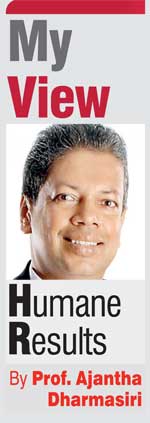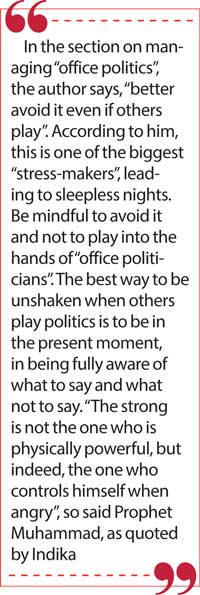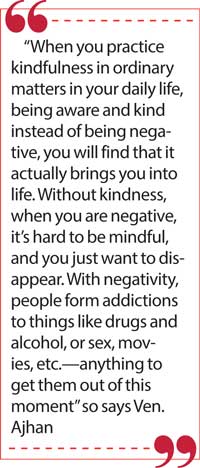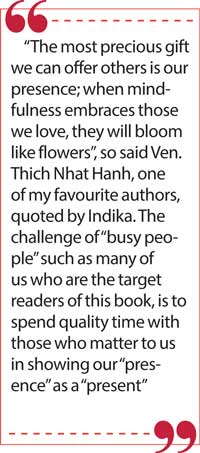Monday Feb 16, 2026
Monday Feb 16, 2026
Wednesday, 4 October 2023 00:05 - - {{hitsCtrl.values.hits}}

Indika Liyanahewage
 It gives me immense satisfaction to see a publication by one of my “learning partners”. It is even more because of its apt theme with much relevance to recent times. While mindfulness is heavily discussed yet hardly practiced, the significance of it can in no way be undermined. Today’s column is all about mindfulness, ‘kindfulness’ and ‘blindfullness’.
It gives me immense satisfaction to see a publication by one of my “learning partners”. It is even more because of its apt theme with much relevance to recent times. While mindfulness is heavily discussed yet hardly practiced, the significance of it can in no way be undermined. Today’s column is all about mindfulness, ‘kindfulness’ and ‘blindfullness’.
Overview
We often complain that our minds are full (mind full) and not mindful enough. Mindfulness is a value enhancing virtue for any sensible human being. I never claim to be an expert on it but always identify myself as a struggling practitioner striving to consistently be mindful. The book titled, “Managing Mindfully” by Indika Liyanahewage, gives some hope that such a struggle is still a worthwhile endeavour.
Indika calls his book, “A child’s guide to lead a happy life for busy people”. He, as leader of an international apparel company obviously belongs to the tribe of “busy people”. His book is structured as managing “work life” as well as “non-work life”. Rather than getting into a trap of being busy and blindly work excessively without achieving expected results, being mindful offers fresh perspectives. He has cited Gauthama Buddha in the opening page: “Do not dwell in the past, do not dream of the future, be mindful on the present moment”.
“Manage or perish” is what we heard at the Postgraduate Institute of Management (PIM) as the popular MBA slogan way back in 2008. “To be very honest, I didn’t understand this until I became the CEO of Eskimo where I work right now, and until the total responsibilities and accountability came onto my shoulders” says Indika. In essence, managers who do not manage properly do perish. It often happens when we do not do “right things right” in producing “right results”. Indika argues that being mindful is one sure-fire way of managing in order to be efficient and effective.
A glimpse through Managing Mindfully
Indika’s book differs from a comprehensive thesis with a collection of concepts and cases. It is a simplified way of sharing a set of thoughts and insights, enriched with apt quotes. One may criticise its skeleton nature, but it serves the purpose of appealing to “busy people” who are enticed to read one chunk at a time. He has included his personal experiences with the “team at home” as well as “team at work” in raising the level of authenticity of his awakened thoughts. Paying tribute to his mother in stating how she managed to nurture three sons as a single parent, he shares how he first learnt mindfulness from her.
 In the segment of “work life”, Indika discussed managing a variety of aspects such as, tasks, meetings, people, boss, office politics, peer conflict, e-mails, etc. He goes into a deeper level of sharing on “non-work life” dealing with areas such as death, health, emotions, social life, etc. The way he shares wittily, how to “manage wife” shows a common authentic experience.
In the segment of “work life”, Indika discussed managing a variety of aspects such as, tasks, meetings, people, boss, office politics, peer conflict, e-mails, etc. He goes into a deeper level of sharing on “non-work life” dealing with areas such as death, health, emotions, social life, etc. The way he shares wittily, how to “manage wife” shows a common authentic experience.
“Well begun is half done”. Indika quotes Aristotle in stating that “the first thing you should do to manage meetings is to reduce meetings. Also stick to the purpose of the meeting by being fully mentally present at the meeting”. “You have a meeting to make a decision, not to decide on the question”, so said Bill Gates.
In the section on managing “office politics”, the author says, “better avoid it even if others play”. According to him, this is one of the biggest “stress-makers”, leading to sleepless nights. Be mindful to avoid it and not to play into the hands of “office politicians”. The best way to be unshaken when others play politics is to be in the present moment, in being fully aware of what to say and what not to say. “The strong is not the one who is physically powerful, but indeed, the one who controls himself when angry”, so said Prophet Muhammad, as quoted by Indika. From Mindfulness to “Kindfulness”
While reading Indika’s book “mindfully”, my mind went back to another masterpiece, written by Ven. Ajahn Bramavanso. Here the erudite thero introduces a new kind of meditation: kindfulness. Kindfulness is the cause of relaxation. It brings ease to the body, to the mind, and to the world. Kindfulness allows healing to happen. So don’t just be mindful, be kindful! With his trademark knack for telling engaging stories paired with step-by-step anyone-can-do-it instructions, the Ven. Thero brings alive and makes accessible powerful tools transformation.
“Do you know the word in Cantonese for very good? It’s ‘Ho ho ho’. Now I understand that Santa Claus is Chinese; he doesn’t come from the North Pole but from the Far East! Image ‘Ho ho ho’ is an example of kindfulness: being aware and giving kindness.” That is how Ven. Ajhan links kindfulness into action. “When I was in Hong Kong, I went to a very nice monastery that many monks from China visited. I had a conversation with the monks there about how to have discipline. If you are going to university, you need to discipline yourself. If you are working, you need to have some sort of restraint to be able to do things that are difficult to do. Everyone has to have some form of discipline but how do you get that discipline? Self-discipline—you can’t force it, but through kindfulness, everything just comes out naturally; you are aware of what is needed at this particular time and also have compassion to do what you should do.”
I see a parallel between what Indika describes in the managerial front and what Ven. Ajhan delineates in a much broader front. It highlights the fact that we are truly human beings and not “human doings or undoings”. In simple terms, kindfulness is mindfulness and kindness coming together. It is relevant to both personal and professional fronts in managing oneself mindfully.
When Indika touches aspects such as managing wife, children, friends, social life, etc, the term kindfulness is of much significance. “When you practice kindfulness in ordinary matters in your daily life, being aware and kind instead of being negative, you will find that it actually brings you into life. Without kindness, when you are negative, it’s hard to be mindful, and you just want to disappear. With negativity, people form addictions to things like drugs and alcohol, or sex, movies, etc.—anything to get them out of this moment” so says Ven. Ajhan in comprehensively supplementing the need. “I hate ‘being here.’ I want to go somewhere else. Take me off into some fantasy land in the movies. Take me off into some weird, drugged state. Get me drunk… Anything but being here.” In such cases you need mindfulness as the sure cure.
“Blindfullness” as the opposite
 It is indeed sad to note the absence of kindfulness among millions who selfishly want to climb their own ladder disregarding fellow human beings. In my view, it is being “blind” to reality. I would simply call it blindfulness. Certainly, it is not the trademarked “blindfulness” used by some westerners in identifying the innate features of blind people who try to be mindful. I refer to it as a common feature in most of us in not seeing the truth in front of us. It can cover areas stemming from political, economic, social, technological, environmental, legal and ethical (PESTELE) dimensions. Being blind to corrupt political practices and saying hurray to politicos as stooges is one such common phenomenon in Sri Lanka.
It is indeed sad to note the absence of kindfulness among millions who selfishly want to climb their own ladder disregarding fellow human beings. In my view, it is being “blind” to reality. I would simply call it blindfulness. Certainly, it is not the trademarked “blindfulness” used by some westerners in identifying the innate features of blind people who try to be mindful. I refer to it as a common feature in most of us in not seeing the truth in front of us. It can cover areas stemming from political, economic, social, technological, environmental, legal and ethical (PESTELE) dimensions. Being blind to corrupt political practices and saying hurray to politicos as stooges is one such common phenomenon in Sri Lanka.
Indika’s invitation to us to “manage mindfully”, is timely and relevant, in enticing us to practice more “kindfulness” in avoiding “blindfulness”. “For what shall it profit a man, if he gains the whole world, and suffers the loss of his soul?” the question raised by Jesus Christ, quoted in the book makes a profound sense here.
Mindfulness should pave the way to identifying oneself in caring, sharing and daring to be truthful. It involves a great deal of kindfulness and no blindfulness in action. “The most precious gift we can offer others is our presence; when mindfulness embraces those we love, they will bloom like flowers”, so said Ven. Thich Nhat Hanh, one of my favourite authors, quoted by Indika. The challenge of “busy people” such as many of us who are the target readers of this book, is to spend quality time with those who matter to us in showing our “presence” as a “present.” As I often heard many veterans say, “who will ever say in his/her death bed, that I wish I could spend one more hour in my office? They will mostly refer to spending more time with someone near and dear. That highlights the kindfulness we need to inculcate.
Way forward
“We are caught in psychological times as the memory of the past and the hope for the future; we don’t know what it is to live totally now; now is life, not behind or ahead”. So said Jiddu Krishnamurti. I have resolved the confusion I had in me with regard to dreaming of the future and living in the present. You may dream as if you would live a hundred years, but you should live today as the only day in life.
“Managing Mindfully”, a self-help guide by Indika Liyanahewage can be read in one go with interest and insights. Practicing kindfulness in avoiding blindfulness is a recipe for resounding results for “busy people” like many of us. The author has the opportunity to expand the book with illustrative cases having global and local relevance in enriching its depth and breadth. “Your vision will become clear only when you can look into your own heart. Who looks outside dreams, who looks inside awakes”. The wonder words of Carl Jung sum up it all.
 (The writer, a senior Professor in Management, and an Independent Non-executive Director, can be reached at [email protected], [email protected] or www.ajanthadharmasiri.info.)
(The writer, a senior Professor in Management, and an Independent Non-executive Director, can be reached at [email protected], [email protected] or www.ajanthadharmasiri.info.)